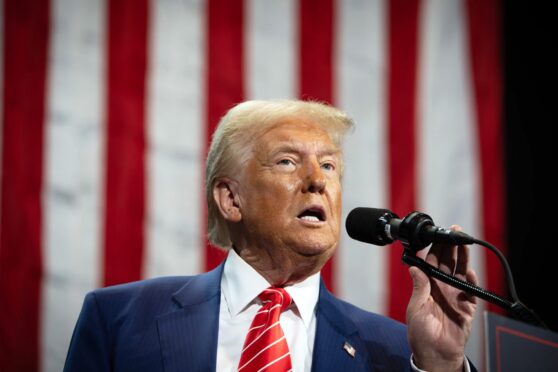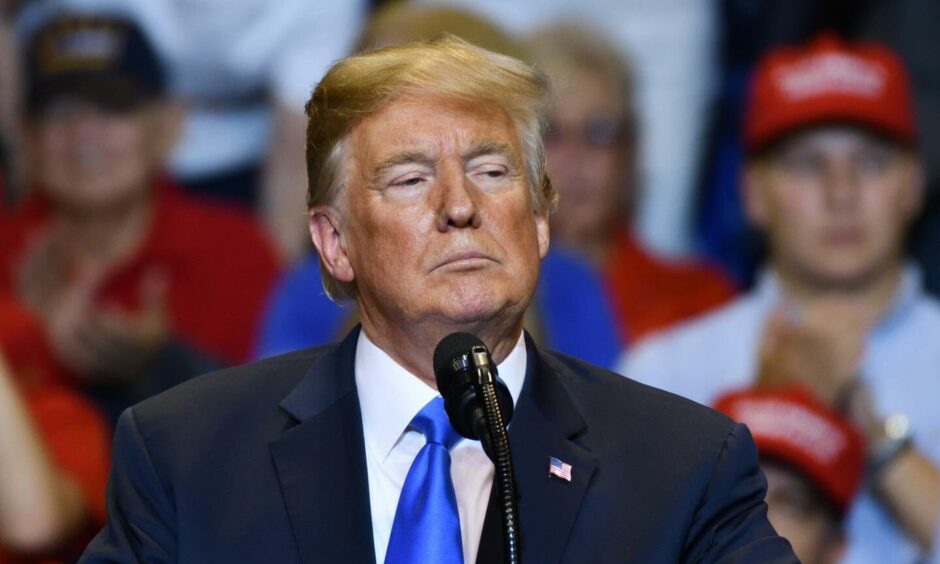
As the clock ticks down on a remarkably close US presidential election, Donald Trump is seeking to turn the focus back to immigration as he looks to put himself narrowly ahead of rival Kamala Harris.
Speaking at a rally in Arizona, a swing state on the border with Mexico, the former president said the country has become a “garbage can” because of Democrat policies.
He called increased immigration under the Biden administration “the most egregious betrayal that any leader in American history has ever inflicted upon our people”, by allowing in an “army of migrant gangs”.
The US electoral system and existing strong party preferences mean the outcome of the election will be decided largely by what happens in Georgia, Michigan, Nevada, North Carolina, Pennsylvania, Wisconsin and Arizona.
Candidates and their surrogates have been blitzing the seven key swing states in the final two weeks before election day.
The Republican vice-presidential candidate, JD Vance, held two campaign rallies in Arizona earlier this week.
Joe Biden and former president Barack Obama are set to visit this week, as is Tim Walz, the Democratic vice-presidential pick.
A visceral issues for voters
Perhaps nowhere else in the country is immigration such an important talking point and experts believe it could be the issue that helps tip momentum in Trump’s favour.
Cliff Young, president of US public affairs for polling company Ipsos, believes inflation remains the key concern for most Americans but immigration, often ranked second, carries the kind of visceral anger that can drive voters to the polls.
He said: “Trump is seen as much stronger on immigration than Harris. That has been one of his core issue since 2015.
“Immigration is a very important issue to mobilise his base.
“It’s going to be a game of inches. It’s going to be about getting your people out verses the other person’s people.
“Immigration is an issue that really touches people viscerally and I think that’s what they’re doing.”
Trump has promised to stage the biggest deportation operation in US history if he returns to the White House.
He has also laid out a range of policies aimed at migrants, including invoking the death penalty for any immigrant that kills an American citizen or law enforcement officer.
He wants to end migrant flights, outlaw sanctuary cities and hire 10,000 more border officials, while increasing their pay.
But his strong policies have come wrapped in even stronger rhetoric.
Trump has continued to repeat his baseless claim that illegal immigrants from Haiti have been eating domestic pets in a small Ohio city.
Is extreme rhetoric working?
During ABC’s presidential debate, Trump said: “In Springfield, they are eating the dogs. The people that came in, they are eating the cats. They’re eating – they are eating the pets of the people that live there.”
The baseless claim had spread on social media, with Republican vice-presidential candidate JD Vance promoting it on X.
US National Security Council spokesman John Kirby called Vance’s comments “dangerous” and a “conspiracy theory… based on an element of racism”.
The claim appears to have come from a number of different sources without evidence, including a Facebook post attributed by the poster to the unnamed friend of a neighbour’s daughter – far from a verified source.
The disinformation campaign led to bomb threats, school closures and forced evacuations.
Trump has also promised to deport Venezuelans he claims have “infected” Aurora, a once-peaceful city in Colorado.
More than 40,000 immigrants have arrived in the Denver metro area over the past two years, including many Venezuelan families fleeing poverty and violence.
It is not based in a swing state but a campaign stop allowed Trump to exploit a video circulating online that showed armed men in a city apartment building so he could falsely portray Aurora as being overrun by a Venezuelan gang.
Despite often being based on falsehoods, Trump’s strategy appears to be working.
A recent poll found more than one-third of Americans agree with his claim that undocumented immigrants in the US are “poisoning the blood” of the country.
“Blood poisoning” was a term used by Adolf Hitler in his Mein Kampf manifesto and Trump’s use of the phrase drew strong condemnation, including from those who have previously backed the Republicans.
However, it could be exactly that incendiary rhetoric that helps Trump secure the final votes he needs to come out on top after November 5.
His campaign has been flooding swing states with advertising on inflation but Cliff Young believes Trump is also seeking to position himself as the saviour of an America his core voter base believes is under threat.
Young said: “It’s not that they’re not hammering home those bread and butter issues, it’s just that we’re getting close and things like immigration and transgender issues are very visceral to his base.
“We know that visceral or anger-based reactions are what get people out to the polls.
“Immigration politics is not about politics. It’s about identity.
“America is changing and a significant swathe of the population feels it is slipping away. They see immigration as the primary driver of that, whether that’s right or wrong.
“They believe Trump is their champion to stem that change.”

Enjoy the convenience of having The Sunday Post delivered as a digital ePaper straight to your smartphone, tablet or computer.
Subscribe for only £5.49 a month and enjoy all the benefits of the printed paper as a digital replica.
Subscribe © SYSTEM
© SYSTEM © Shutterstock / Evan El-Amin
© Shutterstock / Evan El-Amin